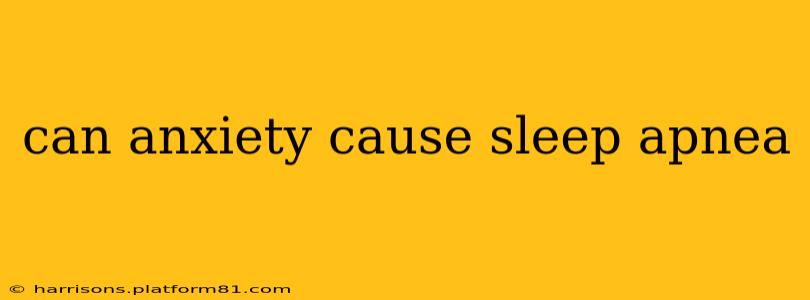Can Anxiety Cause Sleep Apnea? Unraveling the Complex Relationship
Anxiety and sleep apnea are two distinct conditions that can significantly impact an individual's quality of life. While they aren't directly causative of each other, there's a complex interplay between them that warrants understanding. Anxiety doesn't cause sleep apnea in the way a virus causes a cold, but it can exacerbate existing symptoms and contribute to the development of sleep-disordered breathing. Let's delve into the details.
What is Sleep Apnea?
Sleep apnea is a sleep disorder characterized by pauses in breathing during sleep. These pauses, called apneas, can last from a few seconds to minutes and occur repeatedly throughout the night. The most common type is obstructive sleep apnea (OSA), where the airway collapses during sleep, preventing airflow. This leads to fragmented sleep, daytime fatigue, and a range of health problems if left untreated.
How Anxiety Impacts Sleep
Anxiety significantly disrupts sleep. The racing thoughts, worries, and physical symptoms associated with anxiety make it difficult to fall asleep, stay asleep, and achieve restorative rest. This chronic sleep deprivation weakens the body's ability to regulate breathing, potentially worsening existing sleep apnea or increasing the risk of developing it. Furthermore, anxiety can lead to increased stress and muscle tension, which can further constrict the airway and contribute to OSA.
Can Anxiety Worsen Sleep Apnea Symptoms?
Yes, absolutely. Individuals with pre-existing sleep apnea may find their symptoms dramatically worsened by anxiety. The heightened arousal and muscle tension associated with anxiety can increase the frequency and severity of apneas. This results in a vicious cycle: poor sleep due to anxiety worsens sleep apnea, leading to more fatigue and anxiety.
Does Anxiety Increase the Risk of Developing Sleep Apnea?
While not a direct cause, anxiety can be a contributing factor to developing sleep apnea. The chronic stress and poor sleep associated with anxiety create a physiological environment that makes an individual more susceptible to sleep-disordered breathing. Additionally, anxiety often leads to unhealthy coping mechanisms, such as alcohol consumption or poor diet, which are known risk factors for sleep apnea.
What are the Symptoms of Anxiety and Sleep Apnea?
It's crucial to be aware of the overlapping and distinct symptoms of both conditions:
Anxiety Symptoms:
- Excessive worry and nervousness
- Restlessness and irritability
- Difficulty concentrating
- Muscle tension
- Sleep disturbances (difficulty falling asleep, staying asleep, restless sleep)
- Physical symptoms like rapid heartbeat, sweating, shortness of breath
Sleep Apnea Symptoms:
- Loud snoring
- Episodes of stopped breathing during sleep (witnessed by a partner)
- Daytime sleepiness and fatigue
- Morning headaches
- Difficulty concentrating
- Irritability
- High blood pressure
The overlap in symptoms highlights the importance of a proper diagnosis by a healthcare professional.
How are Anxiety and Sleep Apnea Treated?
Treatment approaches often involve addressing both conditions simultaneously. Therapy, medication, and lifestyle changes are key components:
- For Anxiety: Cognitive Behavioral Therapy (CBT) for insomnia, mindfulness techniques, stress management strategies, and potentially medication.
- For Sleep Apnea: Continuous Positive Airway Pressure (CPAP) therapy, oral appliances, lifestyle changes (weight loss, avoiding alcohol and sedatives before bed), and in some cases, surgery.
Can treating Anxiety improve Sleep Apnea?
While not a cure for sleep apnea, effectively managing anxiety can significantly improve symptoms. By reducing stress and improving sleep quality, anxiety treatment can lessen the severity of sleep apnea and improve overall well-being.
Disclaimer: This information is for educational purposes only and should not be considered medical advice. If you suspect you have sleep apnea or anxiety, consult a healthcare professional for proper diagnosis and treatment. They can help determine the underlying causes and recommend the most appropriate course of action.
